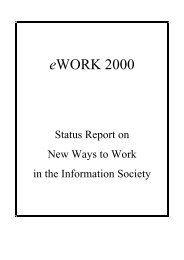Proceedings of 8th European Assembly on telework (Telework2001)
Proceedings of 8th European Assembly on telework (Telework2001)
Proceedings of 8th European Assembly on telework (Telework2001)
You also want an ePaper? Increase the reach of your titles
YUMPU automatically turns print PDFs into web optimized ePapers that Google loves.
132could imagine in the form <str<strong>on</strong>g>of</str<strong>on</strong>g> <strong>telework</strong>. The data collected revealed that (in theory) <strong>on</strong>e out <str<strong>on</strong>g>of</str<strong>on</strong>g> tenemployees could perform his/her work as a <strong>telework</strong>er in the future.Fields <str<strong>on</strong>g>of</str<strong>on</strong>g> <strong>telework</strong>ingWhen looking at in what specific fields <strong>telework</strong> itself can be employed, Hungarian mid a largecompany managers have defined four fields <str<strong>on</strong>g>of</str<strong>on</strong>g> work which could create an opportunity for arelatively high number <strong>telework</strong>ers. They are as follows:• accounting• market research• translati<strong>on</strong>s• data recordingThose questi<strong>on</strong>ed by the survey <str<strong>on</strong>g>of</str<strong>on</strong>g> Psyma could imagine even 50-60 % work in these fields thatcould be performed - also at their firm - in the form <str<strong>on</strong>g>of</str<strong>on</strong>g> <strong>telework</strong>.C<strong>on</strong>diti<strong>on</strong>s <str<strong>on</strong>g>of</str<strong>on</strong>g> <strong>telework</strong>ing in HungaryAccording to the data given by the Nati<strong>on</strong>al Statistical Office (KSH) <strong>on</strong>e third <str<strong>on</strong>g>of</str<strong>on</strong>g> Hungarianemployees works <strong>on</strong> a computer. Given the fact that a computerized workstati<strong>on</strong> is a basic c<strong>on</strong>diti<strong>on</strong><str<strong>on</strong>g>of</str<strong>on</strong>g> establishing <strong>telework</strong> relati<strong>on</strong>s, there is a large target group for <strong>telework</strong>ing in Hungary.However, there are still a number <str<strong>on</strong>g>of</str<strong>on</strong>g> factors that prevent the rapid growth <str<strong>on</strong>g>of</str<strong>on</strong>g> <strong>telework</strong>ing. One <str<strong>on</strong>g>of</str<strong>on</strong>g>them is that many people in Hungary tend to live in flats which are too small to accommodate<strong>telework</strong>. Few people have a separate room or space to designate as a work area. The number<str<strong>on</strong>g>of</str<strong>on</strong>g> home PCs and the relatively high costs <str<strong>on</strong>g>of</str<strong>on</strong>g> telecommunicati<strong>on</strong>s are another barrier. Surfing theinternet during working hours from home is unfortunately still c<strong>on</strong>sidered luxury in Hungary. Thesituati<strong>on</strong> is expected to change with Matáv’s m<strong>on</strong>opoly to be over in 2002.Management AttitudesOne <str<strong>on</strong>g>of</str<strong>on</strong>g> the main barriers to the take-up <str<strong>on</strong>g>of</str<strong>on</strong>g> <strong>telework</strong> is c<strong>on</strong>servative management attitudes. Managersfear that they would not be able to c<strong>on</strong>trol and motivate <strong>telework</strong>ers from a distance. Lack <str<strong>on</strong>g>of</str<strong>on</strong>g>informati<strong>on</strong> and <str<strong>on</strong>g>of</str<strong>on</strong>g> practice <strong>on</strong> managing from a distance are both preventing managers andHR pr<str<strong>on</strong>g>of</str<strong>on</strong>g>essi<strong>on</strong>als from experimenting with <strong>telework</strong> practices. The executives <str<strong>on</strong>g>of</str<strong>on</strong>g> medium sizecompanies are especially skeptical.Those questi<strong>on</strong>ed believe that <strong>on</strong>e <str<strong>on</strong>g>of</str<strong>on</strong>g> the important factors in preventing the spread <str<strong>on</strong>g>of</str<strong>on</strong>g> <strong>telework</strong>is the lack <str<strong>on</strong>g>of</str<strong>on</strong>g> jobs that can be allocated to it. Another thing that holds companies back is thatthey are not certain whether <strong>telework</strong> is more effective in generating higher levels <str<strong>on</strong>g>of</str<strong>on</strong>g> performancethan the traditi<strong>on</strong>al, in-house forms <str<strong>on</strong>g>of</str<strong>on</strong>g> work. In spite <str<strong>on</strong>g>of</str<strong>on</strong>g> the fact that various estimates have beenpublished in the internati<strong>on</strong>al literature with regard to the point to what extent <strong>telework</strong> createfavorable c<strong>on</strong>diti<strong>on</strong>s for more effective performance <str<strong>on</strong>g>of</str<strong>on</strong>g> work, relatively few managers think thatthe employment <str<strong>on</strong>g>of</str<strong>on</strong>g> <strong>telework</strong> would to a great extent c<strong>on</strong>tribute to making the performance <str<strong>on</strong>g>of</str<strong>on</strong>g>








